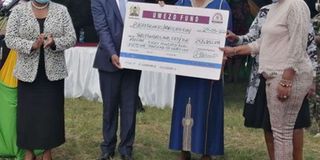Breaking News: KDF chopper crash kills five
300 Kibra girls receive State sanitary towels

What you need to know:
- At least 300 girls from Kibra, Makadara and Roysambu constituencies received sanitary towels.
- Shebesh urged the girls to beware of sex predators, report any case of SGBV to authorities
- Project funded by government in partnership with United Nations Population Fund (UNFPA)-Kenya.
- It has become difficult for girls to manage their periods safely and with dignity during this Covid-19 pandemic.
- Many girls who were getting free, quality sanitary towels in school have no access after schools were closed due to the pandemic.
At least 300 girls from Kibra, Makadara and Roysambu constituencies in Nairobi received sanitary towels on Tuesday.
Speaking during the function held in Kibra, Gender CAS Rachel Shebesh urged the girls to beware of sex predators and report any case of sexual and gender-based violence to authorities.
“As we battle the Covid-19 pandemic, I need you to understand that problems associated with girls are not being put on hold. These kits are to ensure you are dignified as girls and women,” said Shebesh.
“We must ensure that even during pandemics, the sexual and reproductive health needs of our women and girls are not overlooked.”
The project was funded by the government in partnership with United Nations Population Fund (UNFPA)-Kenya.
QUALITY SANITARY TOWELS
Editar Ochieng, a women’s rights advocate from Kibra, said it has become difficult for girls to manage their periods safely and with dignity during this Covid-19 pandemic.
A recent study done in Nairobi’s low-income areas indicates that girls and women continue to face practical and psychological challenges during menstruation.
Many of the girls who were getting free and quality sanitary towels in school have no access after institutions of learning were closed due to the pandemic.
In April, research by Menstrual Hygiene Day, a global advocacy platform for non-profit organisations and government agencies to promote menstrual health, shows that 65 per cent of women and girls in Kenya are unable to afford sanitary pads.
In March, the UN Population Fund called for special attention to menstrual health items since supply chains have been disrupted by the pandemic. The Basic Education (Amendment) Act requires the government to provide free, sufficient and quality sanitary towels to every girl in public schools.
The free sanitary towel program by the government is currently benefiting about four million girls in public schools. In Kenya, one million girls miss school because they lack access to menstrual hygiene supplies, according to local NGO, Zana Africa.





